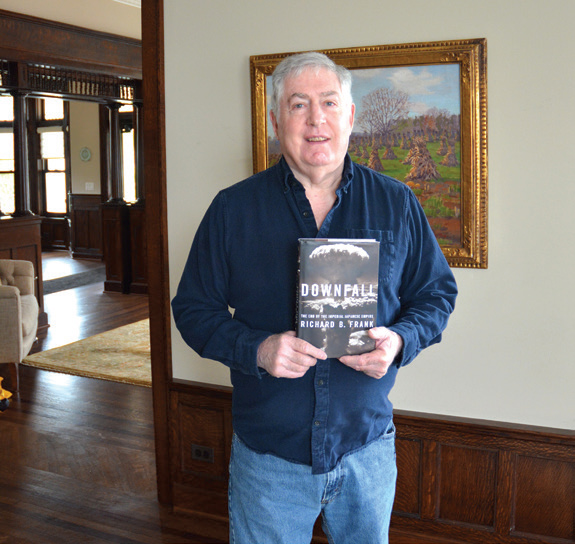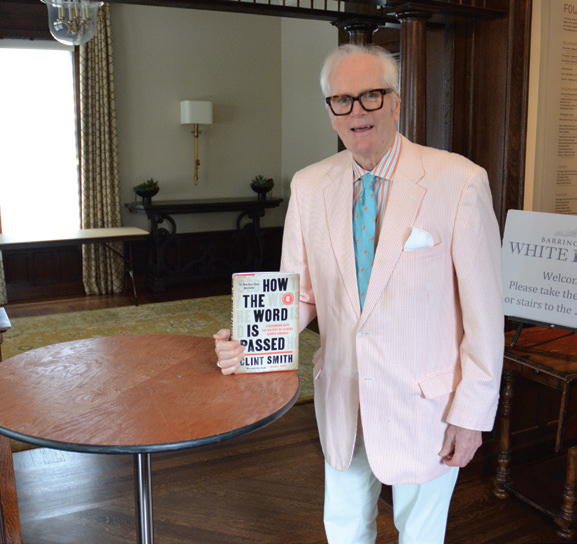
Story by Stephanie Walker • Photography By Jordan Skutar
The short film “The Birthday Gift” is an adaptation of my play “The Abuelas” that first premiered in 2019 at Teatro Vista in Chicago. Before the production in Chicago, we had a reading of “The Abuelas” at Barrington’s White House. The film is about the long repercussions of fascism as it looks at the impact of the 1978-1983 Argentine dictatorship all these years later for one family in Chicago.
The experience of shooting this in Barrington was so special for me. I grew up here. The community has been incredibly supportive. People have donated money, food, and in-kind donations. My neighbors were amazingly patient as we took up all the street parking during the shoot. One day, one of our actors was out on the front porch when someone walked by and asked what we were doing. He said, “Filming the next Avengers movie. Don’t tell anyone!” So, apologies to that person who might be as gullible as I am. It was pretty funny, though.
We shot it at my house for ease and to save money. Making a film is so expensive, even a 15-minute film, and our goal has been to put as much money on screen as possible. It worked so well. My family hosted the out-of-town actors, my director and her husband, and our producer. My dad and stepmom had three actors and our producer at their house and my mom and stepdad had our director and her husband at their house.
Because our lead character is a cellist with the Chicago Symphony Orchestra and our lead actor does not play the cello, we had a cello-double/consultant named Jean Hatmaker. One day I heard cello music coming from my office. It was Jean rehearsing. A “pinch me” moment. Jean left our shoot to go play with Yo-Yo Ma in Kalamazoo!
Teatro Vista (the theatre company that produced my plays “The Madres” and “The Abuelas”) came on board as our Fiscal Sponsor. We could not have done anything without our two very important and supportive local Executive Producers: Jessica and Dominic Green. We are grateful to have the support of the actor Steven Weber who fell in love with the script and came on board as an EP. We are still fundraising for post-production.
The film is with our editor now and going through that process. Because the film is bilingual (in mostly Spanish and English) we will be adding English subtitles for the Spanish dialogue. Once we have our final cut, we’ll be submitting it to film festivals.
My co-writer, Paula, and I are working on writing the feature-length script.
. . . . . . . .
Stephanie Walker is the author of the play and the film’s executive producer.
The Wild Onion
Cook Street Coffee
Ambrosia Patisserie
Pizza Factory of Barrington
Vault 232 in Lake Zurich
The Pink Geranium
The Paper Lantern/Katie Pryor
Our Patient Neighbors!
We asked cultural leaders in Barrington what they are currently reading, how they were attracted to their book, and what they learned that they could share with us. David Nelson is the long-standing co-chairman of the Barrington Cultural Commission. John McLaughlin serves on the Commission’s Humanities Work Group.

Downfall: The End of the Imperial Japanese Empire
By Richard B. Frank
I’ve often wondered why I have such an interest in war history. My father, Jack McLaughlin, served in the 9th Air Force in Europe. My wife’s father, Arthur Barnes, stormed the beach under Mt. Suribachi on Iwo Jima in the first wave of the attack. My childhood hero, John Wayne, starred as Sgt John Striker in “The Sands of Iwo Jima.” I heard about “Downfall: The End of the Imperial Japanese Empire,” from a podcast, “The Unauthorized History of the Pacific War” (August 15, 2023).
What I learned from reading this book was the rationale for dropping the atomic bomb on Japan. It was the least horrific option, saving an estimated 15 million lives in all of Asia. It is important to remember that Japan had conquered Korea, Manchuria, parts of China, and brutalized other countries down through Indonesia. In Vietnam, the rice crop was seized to make fuel for Japanese warships. The Japanese War Journal of the Imperial Headquarters concluded in 1944, “We can no longer direct the war with any hope for success. The only course left is for Japan’s one hundred million people to sacrifice their lives by charging the enemy to make them lose their will to fight.” Proof of this fight-to-the-death mentality was evident in the savage battles for Saipan and Okinawa.
Our other options included blockading and starving the Japanese home islands, continued fire-bombing of Japanese cities, and the invasion of the home islands. What I want people to know is that we don’t live in a black and white world. We live in the liminal, grey area of reality in which decisions are more complex. Labeling ourselves and sticking with the rhetoric is too simple and self-deceiving. We need to learn from history.

How the Word Is Passed:
A Reckoning with the History of Slavery Across America
By Clint Smith
I learned about this book from Courageous Conversations at Barrington’s White House. I wanted to learn more about slavery, in general. Our daughter, Claire, took us to Whitney Plantation in Louisianna—the only plantation currently dedicated to the story of slavery rather than the lives of the slave owners. On that trip, she recognized Clint Smith in the bookstore who was there doing his research for this book.
One thing that sticks in my mind is the hypocrisy of some of the Founding Fathers, such as Thomas Jefferson. He was calling for liberty for all, but did not seem to reconcile that with the fact that he owned 400 slaves. Before reading this book, I did not fully appreciate the profound impact that slavery has had on our country’s history—even to this day. I did not realize how much slavery had been accepted in the North, as well as the South, or that slaves who had escaped continued to be hunted and persecuted in the North. I have come to realize that my own education on the subject of slavery was very thin. The story of Juneteenth, about which I knew nothing until just several years ago, is haunting.
I suspect that many other people of my generation have not done thorough research on slavery in America. This book is a great starting place for anyone who wants to become enlightened on the subject and because the repercussions run so deep in our society today, I think we owe it to ourselves to continue to learn more.
Share this Story